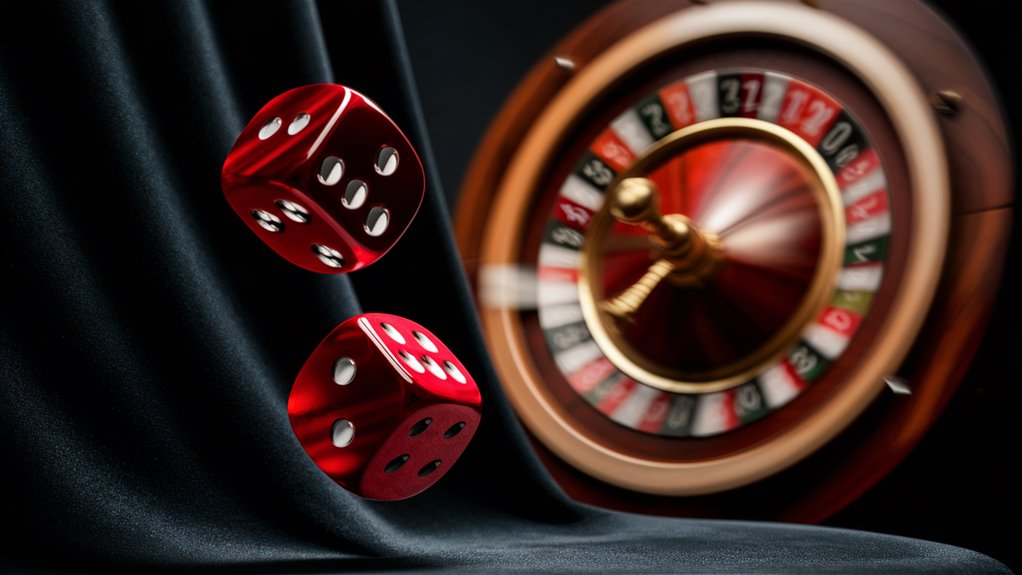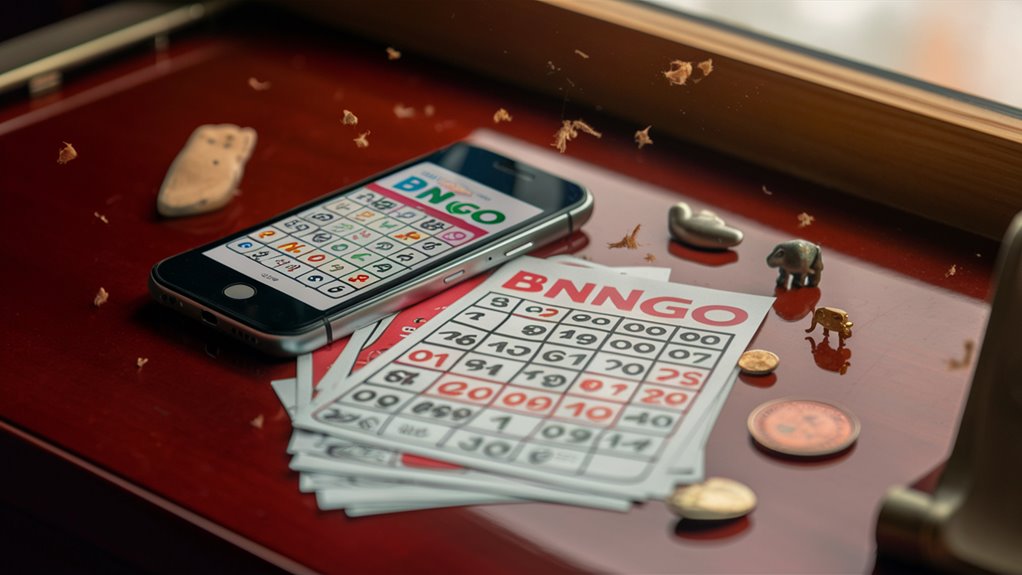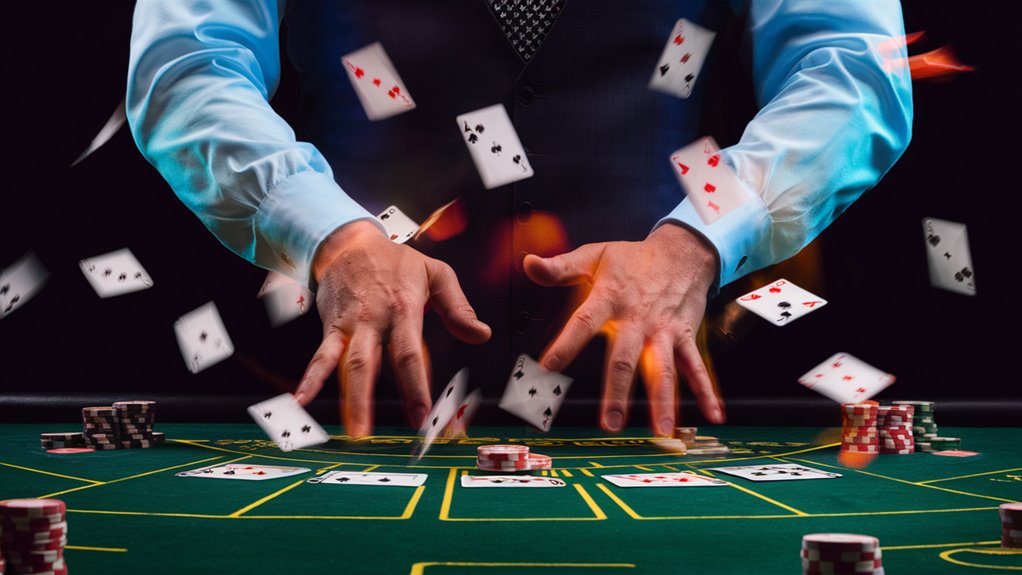Ever wondered what’s really going on behind those flashing lights and spinning wheels at the casino? Well, there’s a lot more to it than meets the eye. Let’s get into the fascinating world where science meets gambling, because trust me, it’s pretty mind-blowing.
You might think it’s just luck when those dice tumble across the table, but there’s actually some serious brainpower working behind the scenes. We’re talking about a clever mix of physics, math, and some pretty impressive tech that makes sure everything stays truly random. You know how your phone can sometimes be a bit predictable? Casino games can’t afford that luxury.
Think of it like this – imagine you’re making the perfect chocolate chip cookie. You need just the right ingredients in just the right amounts, mixed together perfectly. That’s kind of what casinos do with their games, except instead of flour and sugar, they’re mixing probability formulas with high-tech random number generators.
And here’s something that might surprise you – quantum mechanics, that weird and wonderful branch of physics, actually plays a part in some modern casino systems. I know, sounds like sci-fi, right? But it’s true. Some casinos use quantum events to generate their random numbers, which is about as unpredictable as you can get in nature.
So next time you’re watching that roulette wheel spin or waiting for those cards to be dealt, remember – you’re not just playing a game. You’re witnessing a sophisticated dance of science, technology, and chance, all working together to keep things fair and random. Pretty cool when you think about it, isn’t it?
The Physics Behind Roulette Mechanics
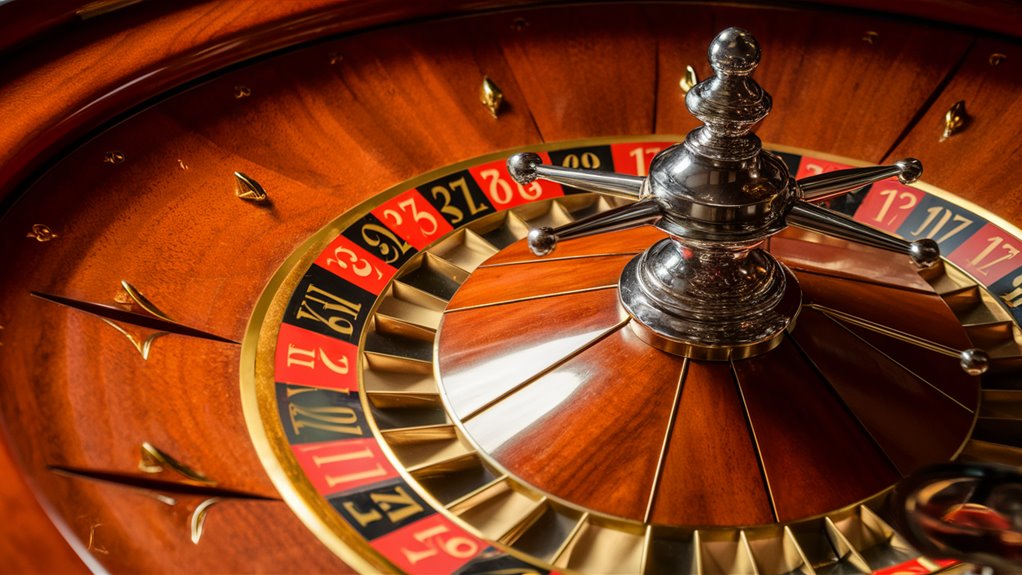
You know how roulette seems like it’s all about luck? Well, there’s actually some fascinating physics happening every time that wheel spins. Let’s break down what’s really going on under the surface of this classic casino game.
Think of the spinning wheel like a carefully choreographed dance of forces. When you watch the ball whirling around the rim, you’re seeing angular momentum in action, kind of like when you swing a bucket of water in circles without spilling a drop.
The wheel itself is a marvel of engineering, with every component precisely balanced to create consistent spins.
The ball’s journey follows some pretty predictable laws of physics, even though the final outcome is random. Picture this: as the ball races around the wheel’s edge, it’s locked in a battle between the force keeping it spinning and the gradual effects of friction slowing it down.
If you watch closely, you’ll spot how the ball loses energy in distinct phases. First, it zooms smoothly along the rim, then starts doing this little bouncing dance, and finally drops into one of those numbered pockets.
Modern casino wheels are pretty clever in their design. They’ve these small metal dividers between numbers that create tiny air disturbances as the ball rolls past, almost like mini speed bumps.
The wheel sits at a slight angle, and there are these diamond-shaped obstacles that help mix things up even more. They’ve even thought about the wheel’s surface material, making sure it grips the ball the same way whether it’s a hot summer day or a chilly winter night.
All these features work together to keep things fair and truly random, so nobody can outsmart the physics of the game.
Random Number Generators Explained

Ever wonder how modern casino games create those unpredictable results? Well, while old-school roulette wheels depend on simple physics, today’s casinos use something way more advanced: Random Number Generators, or RNGs for short.
Think of them as incredibly sophisticated digital dice rollers that use complex math to create totally unpredictable number sequences.
Let’s break down how these fascinating systems actually work. At their core, RNGs rely on what’s called a seed number.
This isn’t just any regular number, though. It’s constantly changing based on tiny details like the exact microsecond when you hit that spin button or even what’s happening in your device’s memory. Pretty clever, right?
You know how fast you can click a mouse? Well, these RNGs are working thousands of times faster than that.
When you tap that “spin” button on a slot machine or ask for cards in video poker, the system grabs the current seed number and runs it through some seriously complex calculations to determine your outcome. It happens so quickly, you wouldn’t even notice the delay.
Here’s something interesting about these systems: they’re not actually random in the purest sense.
They’re what experts call “pseudo-random,” which means they follow incredibly complex mathematical patterns. But don’t worry, these patterns are so sophisticated and move so quickly that it’s practically impossible to predict what’s coming next.
Before any casino can use these systems, they need to pass super strict testing from gaming authorities. This ensures everything stays fair and above board, giving you peace of mind while you play.
Probability Theory in Card Games
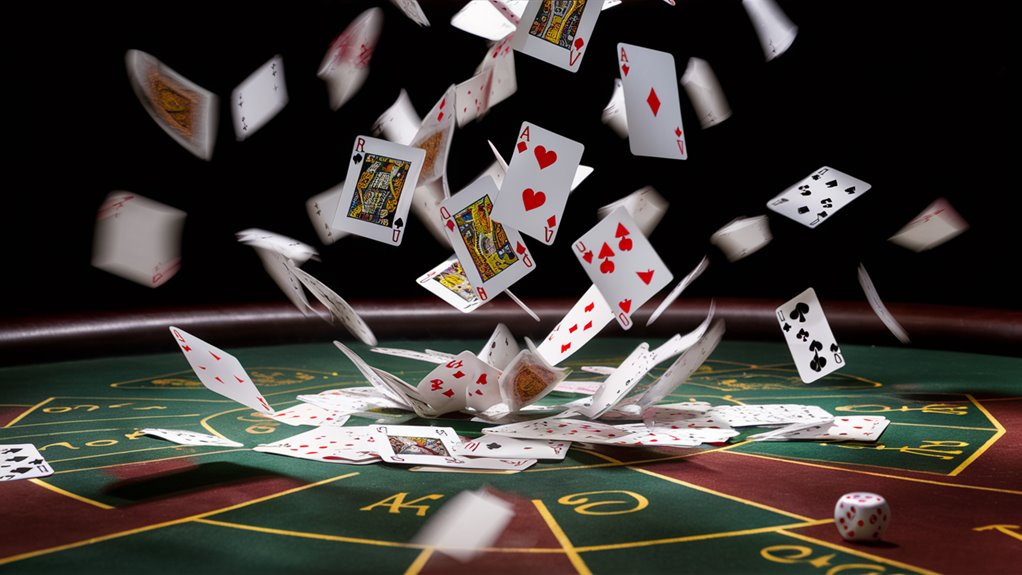
Ever wonder what makes card games so fascinating? Well, it’s all about the math behind the magic, particularly when it comes to games like poker and blackjack. Let’s break down how probability shapes these popular casino favorites.
Think of blackjack as a constantly evolving puzzle. Each time a card leaves the deck, you’re dealing with a slightly different game. It’s kind of like watching the weather change – what happened before affects what might happen next. Pretty cool, right?
Now, poker’s a whole different ball game when it comes to numbers. Picture this: you’re sitting at a poker table, and there are literally millions of possible hand combinations you could get – 2,598,960 to be exact.
Want to know something wild? Getting a royal flush is so rare, it’s like trying to spot a shooting star on a cloudy night. You’ve got better odds of seeing a pair though, which shows up roughly every two or three hands.
Here’s something interesting about blackjack that most people don’t realize. Card counting isn’t just about keeping track of numbers.
It’s about understanding how each card that’s played changes your chances of winning the next hand. Unlike roulette, where each spin is its own thing, blackjack keeps a sort of running memory of what’s happened before.
Just remember, knowing these odds won’t turn you into a guaranteed winner, but it sure helps you make smarter choices at the table. It’s like having a weather forecast for your card game – it won’t tell you exactly what’s going to happen, but it’ll help you prepare for what might come next.
Statistical Testing for Casino Fairness
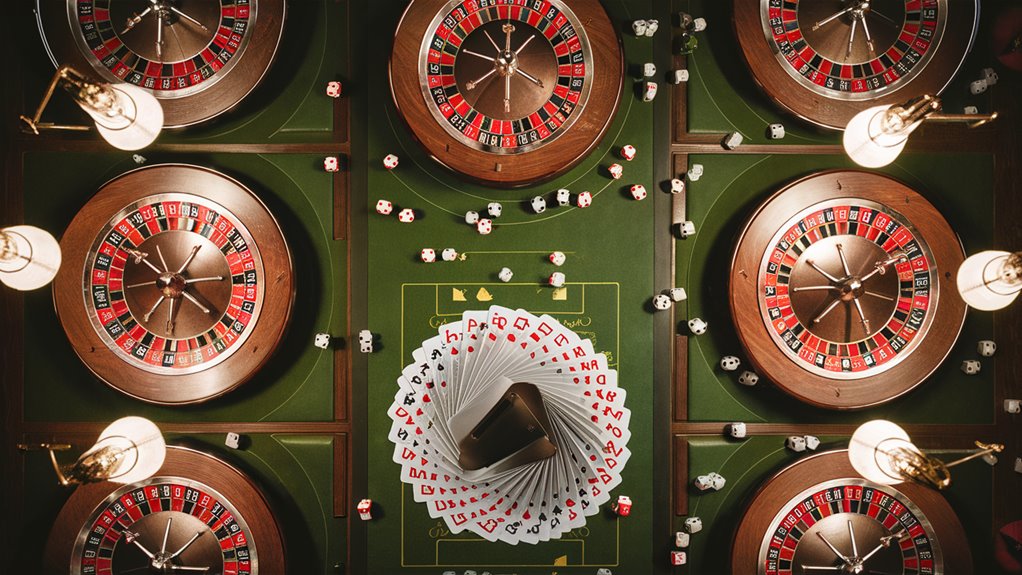
Ever wondered how casinos prove their games aren’t rigged? Let’s dive into the fascinating world of statistical testing that keeps gambling fair and square.
You know, it’s not just about understanding the odds 먹튀검증커뮤니티 casinos actually need hard evidence to show they’re playing by the rules.
Think about a roulette wheel for a moment. Behind the scenes, regulators run something called chi-square tests on thousands of spins.
It’s pretty straightforward, really. They’re checking if the ball lands where it should, statistically speaking. If a wheel keeps hitting certain numbers more than it should, well, that’s a red flag that something might be off.
Now, digital games are a whole different ball game. The computer programs that generate random outcomes, called RNGs, go through some seriously intense testing.
Ever heard of DIEHARD or TestU01? These are like the ultimate lie detectors for casino games, checking millions of outcomes to make sure everything’s truly random and not following some sneaky pattern.
Slot machines are particularly interesting. Before you can even pull that lever or push that button, certification teams have already run the game through millions of virtual spins.
They look at everything from how often you might win to the long-term payback rates. It’s kind of like putting the game through a mathematical obstacle course to ensure it delivers exactly what it promises.
Sure, this might sound a bit technical, but it’s all about making sure you get a fair shake when you’re playing. After all, the house might’ve an edge, but at least now you know there’s solid math backing up the fairness of every game you play.
Entropy Sources in Digital Gambling
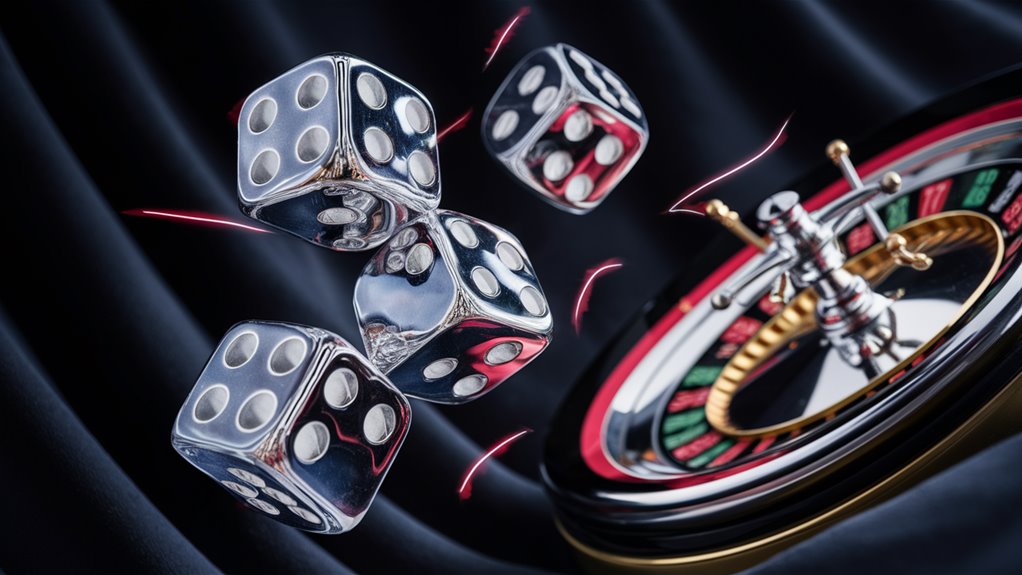
Let’s talk about the fascinating world of entropy in digital gambling. You know how casinos need to keep things random and fair? Well, it all comes down to how they generate those unpredictable numbers that determine whether you win or lose.
Modern digital casinos actually use a pretty clever mix of different random number sources. Think of it like having multiple dice rollers working together to make sure everything stays truly random and fair. Pretty neat, right?
The first way they create randomness is through hardware random number generators, or HRNGs for short. These are like nature’s own dice rollers, using things you can’t predict or control.
Imagine a super-sensitive microphone picking up the subtle crackle of atmospheric noise, or a sensor detecting tiny changes in temperature. That’s the kind of natural chaos these systems tap into.
Then there’s the software side of things. These are called pseudo-random number generators, and they’re like mathematical recipes that take a starting number and scramble it up in complex ways.
When you’re playing your favorite online slot game, it’s probably using one of these systems to determine where those virtual reels will stop.
But here’s the really smart part: most online casinos don’t just pick one method. They combine both hardware and software approaches into what we call a hybrid system.
It’s kind of like having a belt and suspenders – double the security, double the randomness. So every time you place a bet online, there’s actually a whole chain of random events working together to keep things fair and unpredictable.
And you know what’s cool? This technology is constantly evolving. The systems keep getting better at generating truly random numbers, making sure every spin, shuffle, and roll is as fair as possible.
Pretty amazing when you think about how far we’ve come from the old mechanical slot machines, right?
Common Questions
How Do Casinos Prevent Players From Using Quantum Devices to Predict Outcomes?
You might be wondering how casinos stay ahead of high-tech cheaters trying to use quantum devices to predict game outcomes. Well, it’s actually pretty fascinating. Casinos have developed several clever methods to protect their games from these advanced prediction attempts.
First off, most modern casinos surround their gaming areas with special electromagnetic shielding, kind of like a protective bubble that blocks quantum signals. Think of it as an invisible force field that keeps those sneaky quantum measurements from working properly.
They also rely on good old-fashioned signal jammers, which create enough “noise” to make quantum measurements practically impossible. It’s similar to trying to hear someone whisper in a crowded room – there’s just too much interference to get a clear reading.
Regular reshuffling is another simple but effective trick. By constantly mixing things up, casinos make it super hard for any device to track patterns or predict what’s coming next. Plus, they’ve got security teams constantly scanning for electronic equipment using specialized detection systems.
Last but not least, casinos use unpredictable mechanical methods to keep things random. Take roulette wheels, for instance – they’re designed with tiny variations that make each spin truly unique, even to the most sophisticated quantum devices. This combination of high-tech defense and smart mechanical design keeps the games fair and quantum-proof.
Can Environmental Factors Like Humidity Affect the Randomness of Mechanical Games?
You know, it’s fascinating how something as simple as humidity can really mess with games of chance. Think about those playing cards in your deck – when it’s humid, they can get a bit bendy and sticky, making them harder to shuffle properly. And if you’ve ever rolled dice on a muggy day, you might notice they don’t bounce quite the same way they usually do. It’s pretty wild, but even a fancy roulette wheel can spin differently when the air’s thick with moisture. That’s actually why casinos take their climate control super seriously. They keep their gaming floors at just the right temperature and humidity levels to make sure every shuffle, roll, and spin stays fair and random. It’s kind of like how athletes need perfect field conditions for a fair game, except here we’re talking about the science of chance.
Do Player Betting Patterns Influence the Randomness of Subsequent Game Results?
Let’s clear up a common misconception about betting patterns and game outcomes. You know how some players think their betting strategy can somehow influence what happens next in a game? Well, that’s not quite how randomness works.
Think of it like flipping a coin. Each flip is completely independent, regardless of whether you bet heads five times in a row or switched between heads and tails. The coin doesn’t have a memory of your previous bets, and neither do slot machines, roulette wheels, or any other games of chance.
It’s natural to look for patterns – our brains are wired that way. We’ve all had those moments where we thought, “I’ve lost three times in a row, so I must be due for a win!” But mathematical probability doesn’t work like that. Each new game is like hitting a reset button, starting fresh with the same odds as before.
So whether you’re betting small amounts consistently or changing up your wagers, the outcome remains purely random. Your betting patterns might affect your bankroll management, but they can’t influence the mathematical principles behind true randomness. The games will keep doing their thing, following the same probability rules, regardless of how you choose to place your bets.
Remember this the next time you’re tempted to change your betting strategy because you think you’re “due” for a win. The games will keep rolling, spinning, or dealing with the same mathematical certainty as always.
How Often Do Casinos Recalibrate Their Random Number Generation Systems?
Let’s talk about how casinos handle their random number generators, or RNGs as they’re commonly known. You might be surprised to learn that these systems need regular attention to keep games fair and running smoothly. Think of it like maintaining a car – you can’t just set it and forget it.
Most major casinos run daily checks on their RNG systems, kind of like how you might check your car’s oil level. But the real deep dive happens monthly, when they perform complete recalibrations to ensure everything’s working perfectly. It’s similar to taking your car in for a thorough service.
But here’s the interesting part – casinos don’t just trust their own testing. They bring in independent experts every three months to audit their systems. These third-party checks add an extra layer of security and fairness, making sure everything’s running exactly as it should.
Keep in mind that different casinos might follow slightly different schedules, but this pattern of daily checks, monthly recalibrations, and quarterly audits is pretty standard across the industry, especially in reputable establishments. It’s all about maintaining trust and ensuring fair play for everyone at the tables.
What Role Does Human Psychology Play in Perceiving Patterns in Random Events?
You know how our brains love to connect the dots? It’s fascinating how we’re wired to spot patterns everywhere we look, even when they’re not really there. Think about those times you’ve found shapes in cloud formations or heard familiar tunes in random noise – that’s your pattern-seeking brain hard at work.
Let’s be honest, we all do it. Maybe you’ve had a streak of green lights while driving and thought, “Wow, today must be my lucky day!” Or perhaps you’ve noticed that every time you wear your favorite shirt, something good happens. Our minds naturally try to weave these random events into meaningful stories.
The thing is, randomness can actually look pretty structured sometimes. It’s like when you’re playing cards and get three sevens in a row – your brain immediately jumps to the conclusion that something special is happening. But here’s the catch: true randomness often creates what appear to be patterns, even though there’s no real meaning behind them.
Picture throwing a handful of pebbles onto the ground. Some will inevitably land closer together, forming what looks like deliberate groupings. That’s just how randomness works, but our minds can’t help trying to find significance in these chance arrangements.






